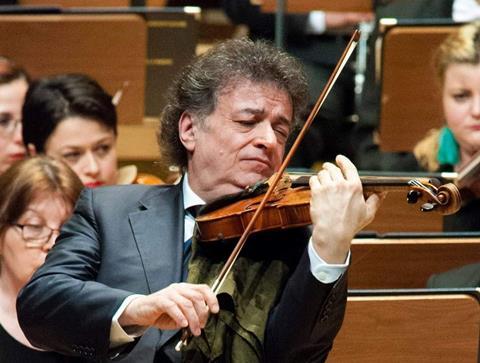A former pupil of Ivan Galamian and Nathan Milstein, the London-based Romanian violin virtuoso died on 21 July 2024, aged 73

The Romanian violinist Eugene Sarbu died on 21 July 2024 in a private hospital in London, following a long illness of more than two years. Sarbu was a laureate of several major competitions and enjoyed an international solo and recital performance career.
Sarbu was born in 1950 in Romania and began his violin studies at the age of five with his father. He made his first solo appearance when he was six and went on to study music in his home town of Galati (under Nachmanovici), Bucharest (with G. Avakian and I. Geanta) and Paris (with Robert Soëtens).
At the recommendation of Yehudi Menuhin, he received a scholarship from the Curtis Institute of Music in Philadelphia to study with Ivan Galamian. Upon graduation, Sarbu continued with Galamian at the Juilliard School in New York, where he received his Master of Music degree, and with Nathan Milstein in London and Zurich.
His international career was launched by a series of gold medals in several major competitions in Europe and North America. These included the Rockefeller Prize for Music in the US, the first prize in the Paganini International Competition ‘Premio Paganini’ in Genoa, Italy, plus first prize and the audience prize in the Carl Flesh International Competition in London.
He also won joint second in the violin section of the International Competition for Musicians – West German Radios, Munich in 1975, plus third place in the International Jean Sibelius Violin Competition in the same year. He placed ninth and seventh at the Queen Elisabeth Competition in 1976 and 1980 respectively.
His performance career saw him in recital with his pianist sister, Carmina Sarbu, as well as performances with orchestras in the UK, US, Europe, Asia, South America and Australasia. His notable solo appearances include the Sibelius Violin Concerto with the BBC Welsh Symphony Orchestra and Henryk Czyz in 1980, the Beethoven Violin Concerto with the Royal Philharmonic Orchestra (RPO) and Antal Doráti in 1981, as well as a BBC Proms performance in 1983, also with RPO and Ferdinand Leitner. He participated in the bicentenary celebration of Paganini in Genoa in 1982, and that year became the conductor and soloist for the European Master Orchestra.
Following the Romanian revolution in 1989, Sarbu initiated a world campaign to help his home country by giving numerous benefit concerts around the world. In December 1994, Eugene Sarbu gave a performance at the Metropolitan Museum in New York, on Paganini’s ’Il Cannone’ Guarneri del Gesù violin. In 1997, he was invited by HRH Prince Charles to perform together with his sister at St. James’ Palace, becoming honorary director of the Romanian National Radio Orchestra in Bucharest that same year. In 1999, Sarbu opened the 1999-2000 season at Carnegie Hall in New York, performing the Brahms Violin Concerto with the American Symphony Orchestra.
Sarbu recorded extensively for the BBC and on disc for EMI and Auvidis. He performed on a Stradivari violin made in Cremona in 1729.
Read: Obituary: violin maker Rowland Ross (1945 - 2024)
Read: Masterclass: Ida Haendel on Bach’s Chaconne in D minor
The number one source for playing and teaching books, guides, CDs, calendars and back issues of the magazine.
In The Best of Technique you’ll discover the top playing tips of the world’s leading string players and teachers. It’s packed full of exercises for students, plus examples from the standard repertoire to show you how to integrate the technique into your playing.
The Strad’s Masterclass series brings together the finest string players with some of the greatest string works ever written. Always one of our most popular sections, Masterclass has been an invaluable aid to aspiring soloists, chamber musicians and string teachers since the 1990s.
American collector David L. Fulton amassed one of the 20th century’s finest collections of stringed instruments. This year’s calendar pays tribute to some of these priceless treasures, including Yehudi Menuhin’s celebrated ‘Lord Wilton’ Guarneri, the Carlo Bergonzi once played by Fritz Kreisler, and four instruments by Antonio Stradivari.













































No comments yet